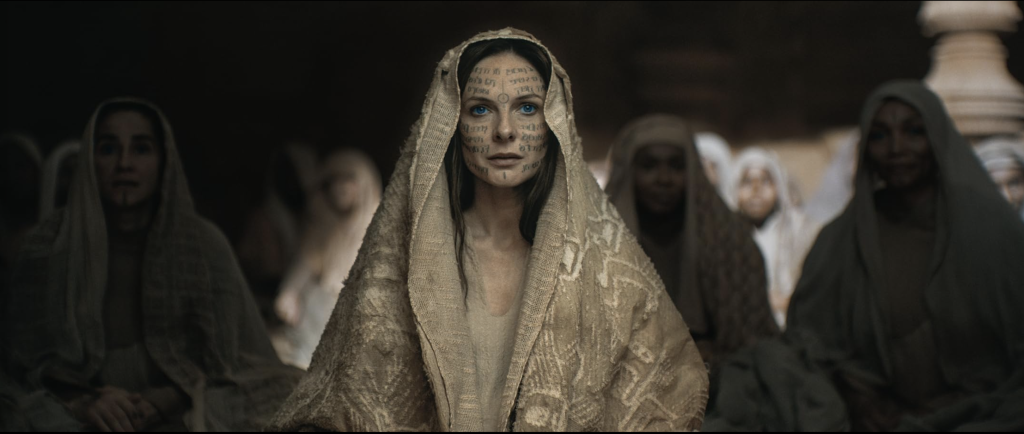The Unraveling of Prophecy: A Bene Gesserit Chronicle

We do not hope; we plan. For centuries, the Bene Gesserit sisterhood has woven the threads of politics, religion, and genetics into a tapestry of control, all leading to one singular point: the birth of the Kwisatz Haderach. We seed faith in the dark corners of the galaxy, planting prophecies like desert flowers that wait for the right season to bloom. These are not stories of saviors, but tools of power. And on Arrakis, our most carefully cultivated garden was about to bear terrifying, unforeseen fruit.
The plan was proceeding. The fall of House Atreides, a regrettable but necessary sacrifice, was complete. The Harkonnens, those brutal and predictable beasts, were restored to power, ensuring the flow of the spice that is the lifeblood of the Imperium. But in the shadows of Arrakis, a loose thread remained: Paul Atreides. A boy trained in our ways, yet one we could no longer control.

Our first glimpse into the coming storm was through the eyes of his mother, the Lady Jessica. She, an acolyte who chose love over duty, had become a key player in our game. The Fremen, a people we had seeded with the myth of the
Lisan al-Gaib—the “Voice from the Outer World”—saw in her son the messiah they had been promised for centuries. This faith, our creation, was a fire we intended to control. But fires, once lit, have a will of their own. Jessica was given a choice: become the Fremen’s Reverend Mother by drinking the poisonous Water of Life, or die. It was a fatal trial for any man, a dangerous path for a woman, but for the Bene Gesserit, it was a necessary step to consecrate the prophecy and solidify her son’s power.
Meanwhile, Paul Atreides walked a razor’s edge. He resisted the path we laid for him, haunted by visions of a holy war waged in his name—a future of galactic horror that he alone could see. He wanted to be a soldier, a fighter for Fremen freedom, not their god. He learned their ways, to walk the desert without rhythm, to fight with their ferocity, and even to ride the great sandworms, earning the Fremen names

Usul and Muad’Dib. But in the south, the fundamentalists, our most fervent followers, waited. They saw his victories not as tactics, but as miracles. The story was unraveling faster than even we could weave it.
The conflict escalated. Paul, as
Muad’Dib, became a demon to the Harkonnens, crippling their spice production and driving their brutal leader, Rabban, to madness. The Emperor, realizing his grip was failing, was forced to intervene. He saw this Fremen prophet as a problem to be managed, a fire to be stamped out with force, but we knew better. Repression only makes a religion flourish. We saw an opportunity to bring forth our backup plan: the Baron’s youngest nephew, the psychotic but controllable Feyd-Rautha. We tested him, secured his bloodline, and learned the levers of his desire and humiliation, preparing him to be the counter-force to Paul’s ascent.
But Paul’s hand was forced. A devastating Harkonnen attack, using the Atreides’ own atomic arsenal, struck the heart of the Fremen resistance. With his forces shattered and his love, Chani, critically injured, Paul faced a terrible choice. To save her, and to finally claim the power to avenge his father, he had to embrace the one thing he feared most. He traveled south, into the heart of the prophecy. He drank the Water of Life.
The transformation was absolute. The boy we knew was gone, replaced by something more. He saw the threads of time, past and future, laid bare. He saw the Emperor’s treachery, the Harkonnen plots, and the holy war waiting to be unleashed. He was no longer running from his destiny; he was seizing it. He emerged not as Paul Atreides, but as the Lisan al-Gaib, the Fremen messiah, ready to lead his followers into a storm that would engulf the galaxy.
The final confrontation was swift and brutal. Paul challenged the Emperor himself, defeating his champion, Feyd-Rautha, in single combat. He claimed the throne, the Emperor’s daughter, and control of the spice. The Great Houses of the Landsraad refused to bow, but it no longer mattered. The holy war Paul had foreseen was no longer a vision, but a command. The legions of Fremen, fueled by centuries of manufactured faith, were ready to follow their messiah to the stars.

And so, the plan succeeded, but the outcome was a horror of our own making. We, the Bene Gesserit, who see the currents of history, now stand on the shore of a raging ocean. We have our Kwisatz Haderach, but the cost may be the universe itself. For we, who do not hope but plan, have unleashed a power that cannot be controlled, a faith that cannot be contained. We have learned the most dangerous lesson of all: when you play with prophecy, you can never truly know who is the puppet, and who is the one pulling the strings. There are no sides.
